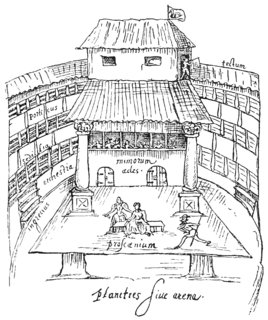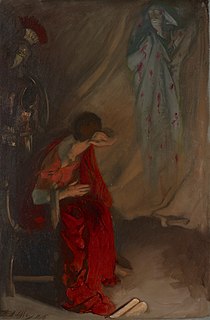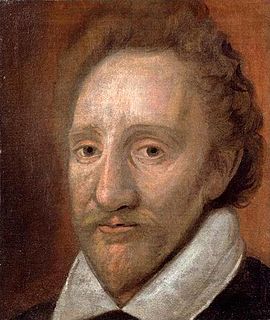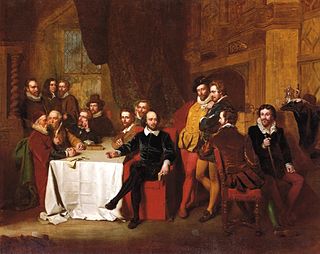Related Research Articles

The Tragedy of Hamlet, Prince of Denmark, often shortened to Hamlet, is a tragedy written by William Shakespeare sometime between 1599 and 1601. It is Shakespeare's longest play, with 29,551 words. Set in Denmark, the play depicts Prince Hamlet and his revenge against his uncle, Claudius, who has murdered Hamlet's father in order to seize his throne and marry Hamlet's mother.

William Shakespeare was an English playwright, poet and actor. He is widely regarded as the greatest writer in the English language and the world's greatest dramatist. He is often called England's national poet and the "Bard of Avon". His extant works, including collaborations, consist of some 39 plays, 154 sonnets, three long narrative poems, and a few other verses, some of uncertain authorship. His plays have been translated into every major living language and are performed more often than those of any other playwright. His works continue to be studied and reinterpreted.

The Merchant of Venice is a 16th-century play written by William Shakespeare in which a merchant in Venice named Antonio defaults on a large loan provided by a Jewish moneylender, Shylock. It is believed to have been written between 1596 and 1599.

English Renaissance theatre, also known as Renaissance English theatre and Elizabethan theatre, refers to the theatre of England between 1558 and 1642.

The Tragedy of Julius Caesar (First Folio title: The Tragedie of Ivlivs Cæsar) is a history play and tragedy by William Shakespeare first performed in 1599. Although the play is named Julius Caesar, Brutus speaks more than four times as many lines as the title character, and the central psychological drama of the play focuses on Brutus.

Richard Burbage was an English stage actor, widely considered to have been one of the most famous actors of the Globe Theatre and of his time. In addition to being a stage actor, he was also a theatre owner, entrepreneur, and painter. He was the younger brother of Cuthbert Burbage. They were both actors in drama. Burbage was a business associate and friend to William Shakespeare.
The King's Men is the acting company to which William Shakespeare (1564–1616) belonged for most of his career. Formerly known as the Lord Chamberlain's Men during the reign of Queen Elizabeth I, they became the King's Men in 1603 when King James I ascended the throne and became the company's patron.
Revenge tragedy is a theoretical genre in which the principal theme is revenge and revenge's fatal consequences. Formally established by American educator Ashley H. Thorndike in his 1902 article "The Relations of Hamlet to Contemporary Revenge Plays," a revenge tragedy documents the progress of the protagonist's revenge plot and often leads to the demise of both the murderers and the avenger himself.

In his own time, William Shakespeare (1564–1616) was rated as merely one among many talented playwrights and poets, but since the late 17th century has been considered the supreme playwright and poet of the English language.

Shakespeare's plays are a canon of approximately 39 dramatic works written by English poet, playwright, and actor William Shakespeare. The exact number of plays—as well as their classifications as tragedy, history, or comedy—is a matter of scholarly debate. Shakespeare's plays are widely regarded as being among the greatest in the English language and are continually performed around the world. The plays have been translated into every major living language.
Metatheatre, and the closely related term metadrama, describes the aspects of a play that draw attention to its nature as drama or theatre, or to the circumstances of its performance.

Richard III (1699) is a history play written by Colley Cibber. It is based on William Shakespeare's Richard III, but reworked for Williamite audiences.

William Shakespeare's style of writing was borrowed from the conventions of the day and adapted to his needs.

Thousands of performances of William Shakespeare's plays have been staged since the end of the 16th century. While Shakespeare was alive, many of his greatest plays were performed by the Lord Chamberlain's Men and King's Men acting companies at the Globe and Blackfriars Theatres. Among the actors of these original performances were Richard Burbage, Richard Cowley, and William Kempe.
William Heminges, also Hemminges, Heminge, and other variants, was a playwright and theatrical figure of the Caroline period. He was the ninth child and third son of John Heminges, the actor and colleague of William Shakespeare, and his wife Rebecca.
The Fatal Contract: A French Tragedy is a Caroline era stage play, written by William Heminges. The play has been regarded as one of the most extreme of the revenge tragedies or "tragedies of blood," like The Spanish Tragedy and Titus Andronicus, that constitute a distinctive subgenre of English Renaissance theatre. In this "most graphic Caroline revenge tragedy...Heminges tops his predecessors' grotesque art by creating a female character, Chrotilda, who disguises herself as a black Moorish eunuch" and "instigates most of the play's murder and mayhem."

William Shakespeare has been commemorated in a number of different statues and memorials around the world, notably his funerary monument in Stratford-upon-Avon ; a statue in Poets' Corner in Westminster Abbey, London, designed by William Kent and executed by Peter Scheemakers (1740); and a statue in New York's Central Park by John Quincy Adams Ward (1872).

A play is a work of drama, usually consisting mostly of dialogue between characters and intended for theatrical performance rather than just reading. The writer of a play is a playwright.

Shylock is a fictional character in William Shakespeare's play The Merchant of Venice. A Venetian Jewish moneylender, Shylock is the play's principal antagonist. His defeat and conversion to Christianity form the climax of the story.
Imogen Says Nothing: The Annotated Life of Imogen of Messina, last sighted in the First Folio of William Shakespeare'sMuch Adoe About Nothing is a three-act play by Aditi Brennan Kapil inspired by a ghost character in Shakespeare's Much Ado About Nothing. The play premiered on January 20, 2017 at the Yale Repertory Theatre.